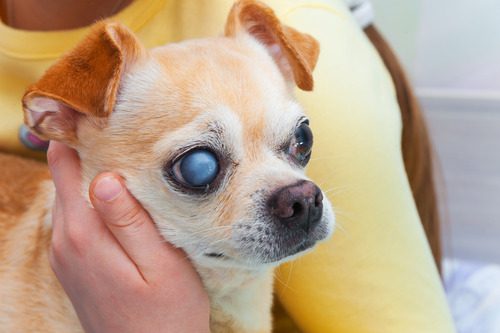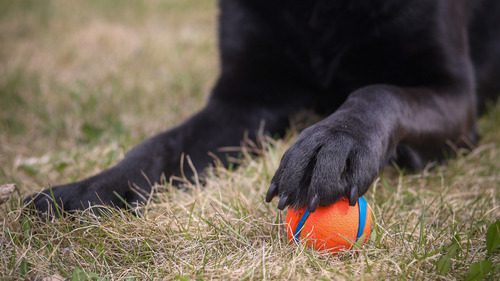Common Causes of Eye Trauma in Dogs
When a dog sustains an eye injury, the results can be painful, alarming, and sometimes irreversible if not addressed quickly. Dogs use their eyes to interpret the world around them—whether they’re exploring the backyard or curling up next to their favorite human. Eye trauma in dogs can range from mild irritation to serious conditions that threaten their vision. In this blog, we’ll discuss what can lead to eye trauma in dogs to help you recognize when something is wrong and when to seek care without delay. Call Companion Animal Hospital of Wakefield in Raleigh at (919) 488-5300 if you suspect your dog has an eye injury. Timely intervention can protect their comfort and long-term eye health.

Blunt Force Injuries and Accidents
Blunt trauma is one of the most common causes of eye trauma in dogs. These injuries happen when a forceful impact affects the eye area without breaking the skin. Dogs can accidentally run into furniture, collide with another animal during play, or get hit by a thrown object. Even a fall from a short distance can result in eye trauma if the impact is concentrated around the face.
Potential Injuries and Symptoms
Blunt trauma may cause swelling, bruising, and visible discomfort. In more severe cases, it can lead to proptosis, which is when the eye is pushed out of its socket. This condition requires emergency care. Other possible injuries include damage to the retina or lens, which can interfere with vision or lead to long-term complications if untreated.
Preventing and Responding to Blunt Force Eye Injuries
Pet owners in Raleigh should remain vigilant during active play and supervise dogs in unfamiliar settings. If your dog begins squinting, pawing at their eye, or showing signs of discomfort, please call (919) 488-5300 to make an appointment with the team at Companion Animal Hospital of Wakefield.
Scratches and Corneal Abrasions
The cornea is the clear outer layer of the eye. It’s also one of the most sensitive and vulnerable parts of a dog’s eye. Corneal abrasions happen when a foreign object or rough surface scratches the cornea. This form of eye trauma in dogs can occur during normal play or while running through tall grass, brush, or wooded areas.
Common Causes of Corneal Scratches
- Playing with other dogs or cats
- Scratches from branches, twigs, or thorns
- Exposure to blowing dust, sand, or debris
- Accidental pawing or rubbing at the eye
Dogs with corneal abrasions may squint, keep their eye closed, or show excessive tearing. Some dogs may try to rub their face on the carpet or furniture for relief. While some scratches are superficial, others can deepen or become infected. Because the eye is so delicate, it’s important to act quickly if you notice any symptoms. Prompt evaluation helps reduce discomfort and prevents further injury.
Foreign Bodies in the Eye
A foreign object lodged in the eye is another serious source of eye trauma in dogs. This might include dirt, seeds, plant material, or even tiny insects. Dogs often get debris in their eyes while sniffing around outdoors or during car rides with their heads out the window.
How to Recognize a Foreign Object
- Excessive blinking or squinting
- Visible redness or discharge
- Pawing at the eye or rubbing their face
- A foreign object visible on or under the eyelid
Foreign bodies can quickly irritate the eye and cause scratches or infections if not removed. In some cases, the debris becomes lodged under the third eyelid, making it difficult to spot without veterinary equipment. If you suspect your dog has something in their eye, please call (919) 488-5300 to schedule a professional examination. Avoid attempting to remove the object at home, as this can cause additional damage.
Bites and Fights
Eye trauma in dogs can also occur during altercations with other animals. Whether it’s a brief scuffle at the dog park or a territorial dispute at home, bites and scratches near the face are common sources of injury. Even if the eye itself isn’t punctured, trauma to the surrounding tissue can lead to swelling, bruising, and internal damage. Dogs with short noses or bulging eyes—such as Shih Tzus, Pugs, or French Bulldogs—are at higher risk. Their eyes sit closer to the surface of the face, making them more vulnerable during fights.
Injuries from bites can become infected quickly due to the bacteria present in an animal’s mouth. You may not always see an obvious wound, but changes in behavior, swelling, or discharge around the eye may point to trauma. Veterinary attention is necessary to assess the full extent of the injury and prevent complications.
Chemical and Irritant Exposure
Household cleaners, lawn treatments, and grooming products can all lead to chemical-related eye trauma in dogs. Even substances marketed as pet-safe can irritate a dog’s sensitive eye tissue if used improperly. Accidental exposure can happen through splashing, aerosol sprays, or residue on the floor or grass that gets transferred to the face.
What Are Some Common Chemical Eye Irritants?
- Cleaning sprays or disinfectants
- Shampoo or grooming sprays
- Fertilizers or weed killers
- Soaps and detergents
If your dog begins blinking rapidly, showing redness, or displaying signs of discomfort after contact with a chemical, call your veterinarian immediately. Avoid rinsing the eye at home unless instructed to do so by a professional. Some substances can react badly with water or require specific treatment to minimize damage. For Raleigh-area pet owners, Companion Animal Hospital of Wakefield can assess your dog’s condition and recommend appropriate treatment to protect their eye health.
Trauma from Dry Eye or Chronic Conditions
Not all eye trauma in dogs happens suddenly. Some dogs experience chronic eye conditions that leave them more vulnerable to injury over time. For example, dry eye (keratoconjunctivitis sicca) reduces tear production, which can lead to corneal irritation and ulceration. Dogs with this condition often develop thick discharge and may rub their eyes frequently, leading to self-inflicted trauma.
Other Conditions That Increase Risk
Other chronic conditions, such as entropion (where the eyelid rolls inward) or glaucoma, can cause discomfort and increase the likelihood of damage. These ongoing issues may not seem urgent at first, but over time, they contribute to repeated irritation or injury.
The Role of Routine Eye Exams
Routine eye exams help detect these underlying problems early. If your dog has a history of eye issues or breeds predisposed to them, speak with your veterinarian about monitoring and long-term care.
When Is It Time to Seek Veterinary Care?
Even minor eye trauma in dogs can worsen quickly. The eye is a sensitive organ, and injuries that seem small at first can lead to infection, vision loss, or chronic discomfort if left untreated. Acting quickly gives your veterinarian the best chance to treat the issue before it becomes more serious.
Signs That Warrant Immediate Veterinary Attention
- Redness or swelling
- Squinting or holding the eye shut
- Pawing at the face or rubbing the eye
- Thick discharge or bleeding
- A visible object stuck in or near the eye
- A cloudy or bluish appearance in the eye
If your dog exhibits any of these symptoms, call Companion Animal Hospital of Wakefield in Raleigh at (919) 488-5300 to schedule an exam. Avoid waiting to see if the issue resolves on its own. Prompt care can help protect your dog’s comfort and vision.
Supporting Your Dog’s Ocular Health
Understanding the common causes of eye trauma in dogs helps pet owners in Raleigh take proactive steps to protect their pets. Whether it’s avoiding high-risk environments, choosing gentle grooming products, or supervising playtime, small changes can make a meaningful difference. If your dog has an eye injury—or you’re not sure what’s causing their discomfort—please contact Companion Animal Hospital of Wakefield at (919) 488-5300. Your veterinarian can provide the support your dog needs and help prevent long-term issues before they begin.
Recent Posts

Everything You Need to Know about Hepatitis in Dogs

Reasons Your Cat is Losing Weight

My Dog’s Eye is Cloudy: Should I Be Worried?
About Us
At Companion Animal Hospital of Wakefield, our veterinarians in Raleigh, NC, provide better care for your pets. As members of your family, cats and dogs deserve the highest level of medicine with the most compassion. That’s why we put a strong emphasis on personalized care for your pet and client education for you. We believe that when we take the time to help you thoroughly understand your pet’s health, we’re able to make the best decisions for their care together.


